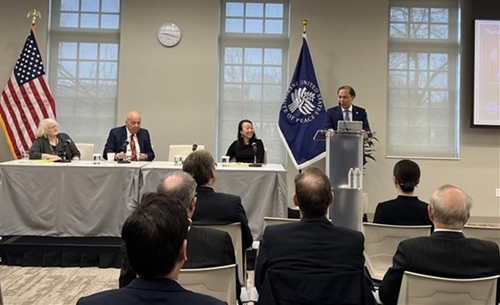The event attracted nearly 200 guests who were scholars, historians, and representatives of some organizations and associations.
    |
 |
|
Vietnamese Ambassador to the U.S. Nguyen Quoc Dung speaks at the webinar on February 16. |
Addressing the webinar’s main session, Vietnamese Ambassador Nguyen Quoc Dung emphasized that the Paris Agreement on Ending the War and Restoring Peace in Vietnam was a result of the sacrifice by millions of Vietnamese people, their strong desire for peace, independence, and national reunification, as well as the art of negotiation and the opportunity-seizing ability of many excellent diplomats from the parties concerned.
It was an important milestone and a turning point for Vietnam and Southeast Asia at large. To the Vietnam - U.S. relations, it put an end to a sorrowful chapter and heralded a long process towards reconciliation, mutual understanding, normalization of bilateral ties in 1995, and establishment of a comprehensive partnership in 2013, he said.
Dung went on to say that the 50th anniversary of the Paris Peace Accords signing is an occasion to contemplate the value of peace and the precious lessons that the agreement generated for peace, security, and international relations.
To maintain peace and prevent conflicts, countries, especially superpowers, should thoroughly understand the history of small countries’ aspirations and legitimate interests, while attaching importance to the key role of diplomacy in preventing and ending wars, according to the ambassador.
At the event, Ambassador Dung, Ambassador John D. Negroponte – former assistant to then U.S. National Security Advisor and Secretary of State Henry Kissinger at the Paris negotiations, Prof. Carolyn Eisenberg, Prof. Nguyen Thi Lien Hang, and guests shared their views on the deal signing and personal accounts during the agreement negotiation and enforcement processes.
Talking to the Vietnam News Agency, USIP Vice President William Taylor said the 50th anniversary is an ideal chance for all parties to look back on the history, assess the successes and shortcomings of efforts to prevent conflicts in the past, and gain lessons for the future.
Source: VNA